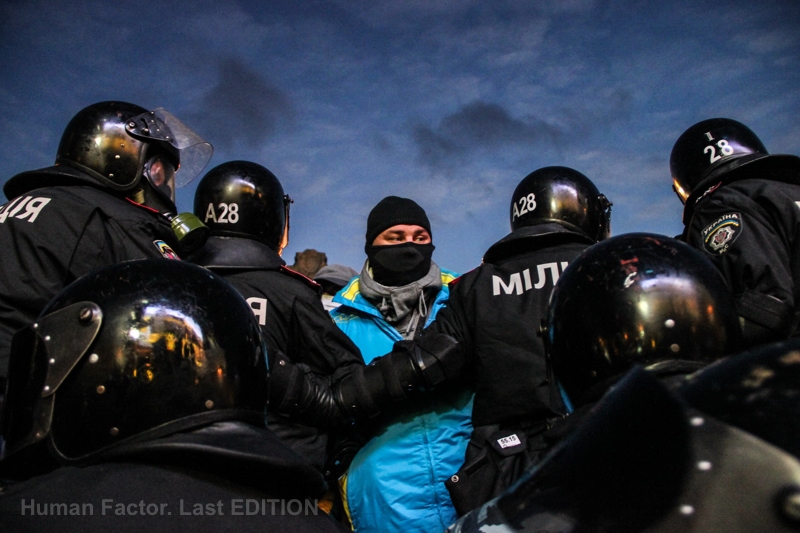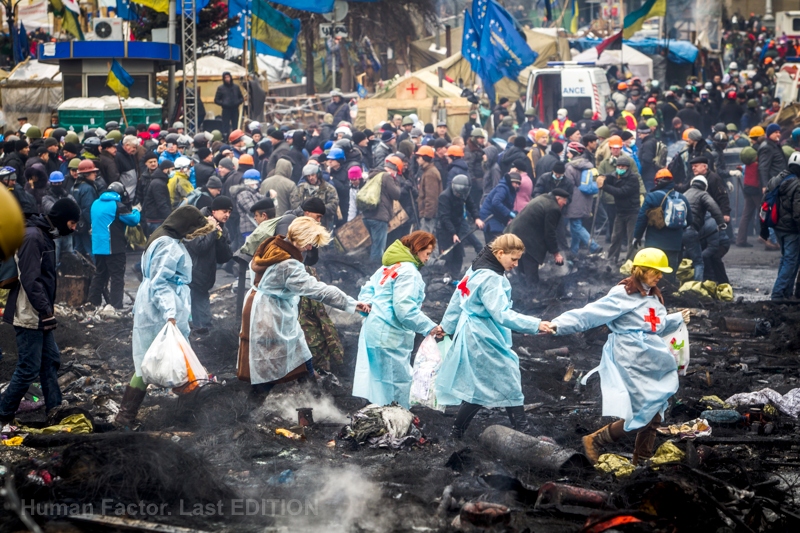The recent decision of the European Court of Human Rights regarding the Yanukovych government's violation of human rights during Euromaidan not only serves justice to the victims. It also reconstructs crucial events of the consequential uprising, dispelling Russian propaganda, and admonishes the Ukrainian government's tedious lack of progress on investigating crucial events of its recent history.
Here is what the Court decided, and why it matters.
From Kyiv to Strasbourg: key facts

ECtHR rules Yanukovych government responsible for crimes against Euromaidan, death of one protester[/boxright] The ECtHR’s decisions concern the events of the Revolution of Dignity, when the political regime of Viktor Yanukovych used both State forces and non-State groups, paid thugs controlled by the police (called titushky; notably, this very term was adopted by the Court itself and used without quotation marks) against peaceful protesters. Clashes between the two sides culminated in February 2014, when more than a hundred people were killed by gunshot wounds or otherwise, while thousands were injured. Ukrainian authorities launched a series of investigations into human rights violations against high-ranking officials and law enforcement. As will be observed, the efforts appeared insufficient. This is a rather short and general overview of the Ukrainian situation. It can be supplemented by thousands of individual stories, revealing the full extent of this period of Ukrainian history since November 2013.
Many victims, having been unable to find justice at the national level, turned to the ECtHR.
These ECtHR decisions are not the end of the era of Ukrainian cases before international courts. They are only a small part of decisions regarding the events in Ukraine, while many more are yet to come.
The ECtHR still needs to address Ukraine's interstate claims against Russia regarding alleged human rights violations in Donbas and Crimea.
Meanwhile, other courts will decide on individual criminal responsibility (the International Criminal Court) and Russia's accountability for its alleged failure to comply with the obligation to refrain from financing terrorism and employing discriminatory practices (the International Court of Justice).
Legal battle: How Ukraine sues Russia in international courtsThe five cases considered thus far by the ECtHR concerned the general context of the Euromaidan events and unique situations of human rights abuses faced by individuals. These are:
- Shmorgunov and Others v. Ukraine: between 30 November 2013 and 18 February 2014, Ukrainian police used physical force, plastic bullets and tear gas against protesters in Kyiv. Some of the protesters were detained because of their participation in the Revolution and beaten for hours. Although a domestic investigation into those violations had been launched, it resulted in only one conviction. Internal inquiries of Ukrainian law enforcement established that the use of force was excessive, but failed to identify those responsible. In many other cases, the investigation is still ongoing.
- Lutsenko and Verbytskyy v. Ukraine: activists Ihor Lutsenko and Yuriy Verbytskyy were abducted from a hospital, ill-treated, and left in a freezing cold forest. Ihor Lutsenko managed to reach a highway, find help and survive, while Yuriy Verbytsky's body was later found in a strip of forest. All these acts were allegedly committed by titushky. The suspects have been identified, some evidence has been collected, and an investigation has been launched, but it is still ongoing.
- Kadura and Smaliy v. Ukraine: Volodymyr Kadura was an activist of the Automaidan, the automobile “cavalry” of the Euromaidan revolution. He was beaten by people dressed in civilian clothes. Kadura was then detained because of his participation in protests and suffered physical abuse in the police station as well. The domestic courts that upheld Kadura’s detention dismissed the allegations of ill-treatment. Viktor Smaliy was arrested and beaten, and the investigation is still ongoing.
- Dubovtsev and Others v. Ukraine: fourteen applicants were detained in Dnipro after clashes with police and titushky. Although some of them were compensated for illegal detention, the criminal proceedings instituted against judges, prosecutors and police have been closed or are still ongoing.
- Vorontsov and Others v. Ukraine: the applicants took part in the Euromaidan protests in Kharkiv. They were detained for disobeying the police and found guilty of administrative offenses, in particular, for using offensive language against the police.
- right to life (in the context of the murder of Yuriy Verbytskyy),
- prohibition of ill-treatment (including inadequate medical care during detention) and lack of effective investigation into those acts;
- right to liberty and security (due to illegal and unjustified detentions, and the absence of an enforceable right to compensation);
- right to freedom of assembly, in particular through attempts to prevent or disperse protests.
The phrase "the investigation is still ongoing" concludes the description of the majority of them.
Peaceful protest and neglected rights: what did the Court say?

The ECtHR noted that some abductions were committed by titushky acting under the control of the State.
After examining government materials and statements supporting this view, the ECtHR emphasized that even despite individual instances of violence by some protesters, such actions did not indicate the demonstrators’ overall intent either to commit violence, or to resist the police.
Lessons to consider

- Crucial facts have been reconstructed. Now Ukrainian society can benefit from the findings of an authoritative and independent international institution. They concern circumstances which frequently become targets for manipulation and propaganda, and the Ukrainian case demonstrates how international justice and forums promoting it can help to combat such factual misconceptions. The key facts concerning Euromaidan, outlined by the Court, are:
- the Maidan protest was peaceful in nature, while individual acts of violence by some protesters in no way refute this fact;
- it was the State’s deliberate strategy to disperse the protest, and excessive force was used for that purpose;
- titushky acted under the control of the State.
- Applicants will be paid awards, but it's unclear when. The Court ordered Ukraine to pay some applicants compensations for pecuniary and non-pecuniary damage, ranging from € 1,200 to € 30,000, depending on the gravity of the violation. However, the Court's decision is not enforced immediately - the applicants still have to go through the enforcement phase in Ukraine. This applies in particular to the receipt of payments; when they will be made in reality is difficult to predict. But more importantly, the Court’s decisions demonstrate that international justice may become a valuable alternative when domestic mechanisms appear ineffective.
- Victims were forced to seek justice outside the homeland. After seven long years, the investigation into the historical events of the Euromaidan Revolution has progressed much further at the international level than at home in Ukraine.

The obligation to conduct a prompt and effective investigation exists not only to satisfy public interest. There is a significant practical value of being efficient: information can be destroyed or lost and witnesses and culprits can forget details.
 Maksym Vishchyk, legal consultant of the Global Rights Compliance, and Lidia Volkova work together on the GRC project "International Law and Defining Russia's Involvement in Crimea and Donbas." The project aims to equip Ukraine and its allies with an authoritative international legal opinion on Russia’s role in Crimea and Donbas.
Maksym Vishchyk, legal consultant of the Global Rights Compliance, and Lidia Volkova work together on the GRC project "International Law and Defining Russia's Involvement in Crimea and Donbas." The project aims to equip Ukraine and its allies with an authoritative international legal opinion on Russia’s role in Crimea and Donbas. Read also:
- What we know about the bloodiest days of Euromaidan
- Legal battle: How Ukraine sues Russia in international courts
- European Court of Human Rights hints Russia responsible for Donbas damages
- Executed in Donbas: activists present data on 95 extrajudicial killings
- ECtHR rules Yanukovych government responsible for crimes against Euromaidan, death of one protester
- Maidan massacre probe to face even more threats in 2020
- Case of Euromaidan massacre may never be solved as Berkut suspects freed for prisoner exchange with Russia

